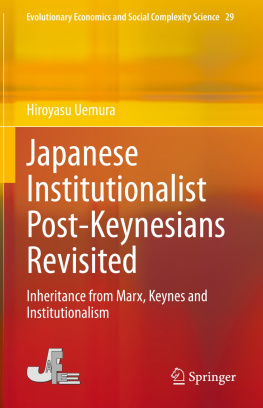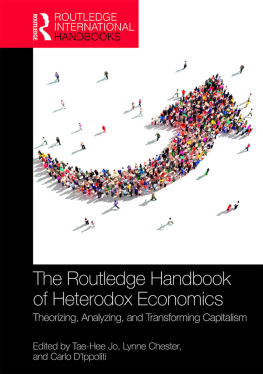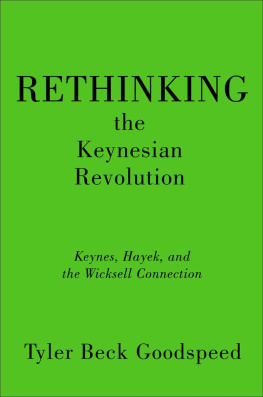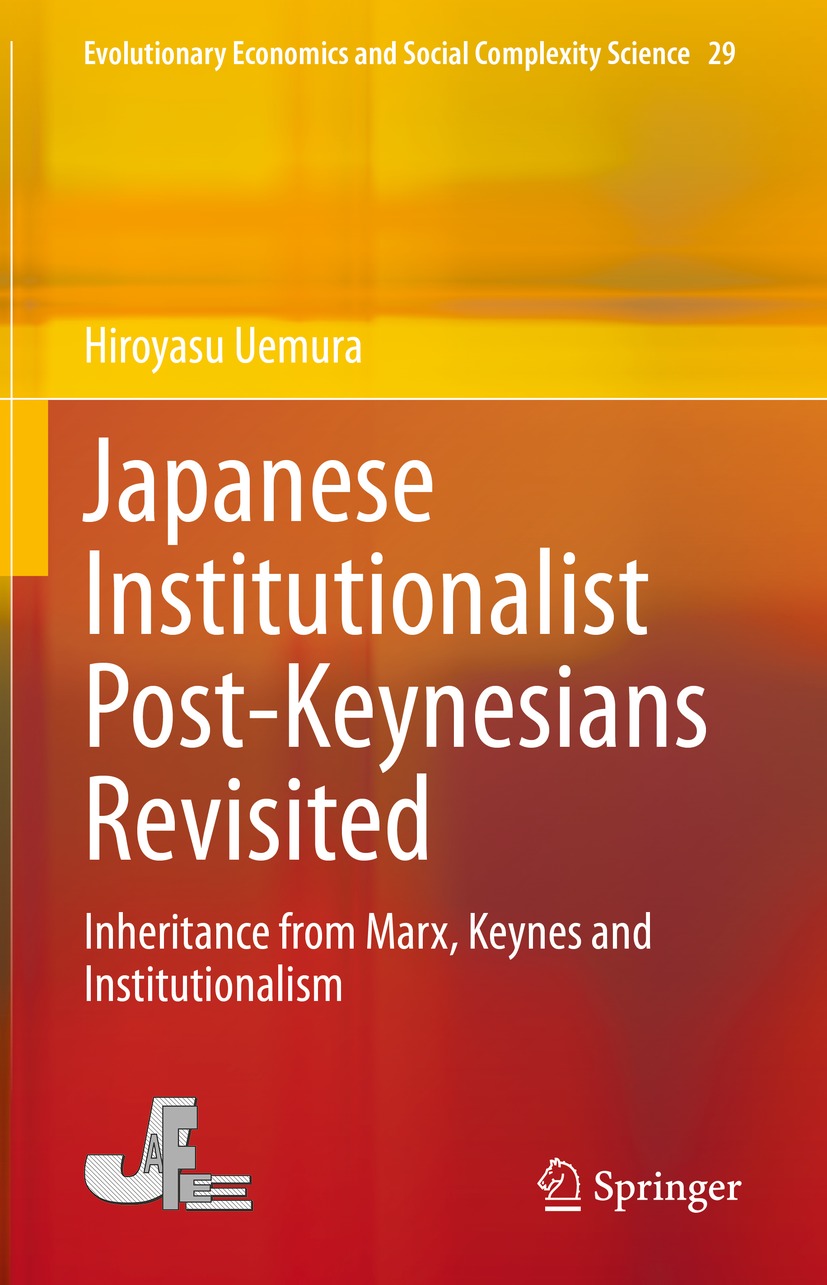Volume 29
Evolutionary Economics and Social Complexity Science
Editors-in-Chief
Takahiro Fujimoto
Waseda University, Tokyo, Japan
Yuji Aruka
Institute of Economic Research, Chuo University, Hachioji-shi, Japan
The Japan Association for Evolutionary Economics (JAFEE) always has adhered to its original aim of taking an explicit "integrated" approach. This path has been followed steadfastly since the Associations establishment in 1997 and, as well, since the inauguration of our international journal in 2004. We have deployed an agenda encompassing a contemporary array of subjects including but not limited to: foundations of institutional and evolutionary economics, criticism of mainstream views in the social sciences, knowledge and learning in socio-economic life, development and innovation of technologies, transformation of industrial organizations and economic systems, experimental studies in economics, agent-based modeling of socio-economic systems, evolution of the governance structure of firms and other organizations, comparison of dynamically changing institutions of the world, and policy proposals in the transformational process of economic life. In short, our starting point is an "integrative science" of evolutionary and institutional views. Furthermore, we always endeavor to stay abreast of newly established methods such as agent-based modeling, socio/econo-physics, and network analysis as part of our integrative links. More fundamentally, "evolution" in social science is interpreted as an essential key word, i.e., an integrative and /or communicative link to understand and re-domain various preceding dichotomies in the sciences: ontological or epistemological, subjective or objective, homogeneous or heterogeneous, natural or artificial, selfish or altruistic, individualistic or collective, rational or irrational, axiomatic or psychological-based, causal nexus or cyclic networked, optimal or adaptive, micro- or macroscopic, deterministic or stochastic, historical or theoretical, mathematical or computational, experimental or empirical, agent-based or socio/econo-physical, institutional or evolutionary, regional or global, and so on. The conventional meanings adhering to various traditional dichotomies may be more or less obsolete, to be replaced with more current ones vis--vis contemporary academic trends. Thus we are strongly encouraged to integrate some of the conventional dichotomies. These attempts are not limited to the field of economic sciences, including management sciences, but also include social science in general. In that way, understanding the social profiles of complex science may then be within our reach. In the meantime, contemporary society appears to be evolving into a newly emerging phase, chiefly characterized by an information and communication technology (ICT) mode of production and a service network system replacing the earlier established factory system with a new one that is suited to actual observations. In the face of these changes we are urgently compelled to explore a set of new properties for a new socio/economic system by implementing new ideas. We thus are keen to look for "integrated principles" common to the above-mentioned dichotomies throughout our serial compilation of publications. We are also encouraged to create a new, broader spectrum for establishing a specific method positively integrated in our own original way.
Editors in Chief
Takahiro Fujimoto (Prof., Waseda Univ.)Yuji Aruka (Prof. em., Chuo Univ.)
Editorial Board
Satoshi Sechiyama (Prof. em., Kyoto Univ.)Yoshinori Shiozawa (Prof. em., Osaka City Univ.)Kiichiro Yagi (Prof. em., Kyoto Univ., Prof., Setsunan Univ.)Kazuo Yoshida (Prof. em., Kyoto Univ., Prof., Kyoto Sangyo Univ.)Hideaki Aoyama (Prof., Kyoto Univ.)Hiroshi Deguchi (Prof., Tokyo Institute of Technology)Makoto Nishibe (Prof., Hokkaido Univ.)Takashi Hashimoto (Prof., Japan Advanced Institute of Science and Technology)Masaaki Yoshida (Prof., Sensyu Univ.)Tamotsu Onozaki (Prof., Rissho Univ.)Shu-Heng Chen (Prof., National Chengchi Univ.)Dirk Helbing (Prof., Eidgenssische Technische Hochschule Zrich)
Hiroyasu Uemura
Japanese Institutionalist Post-Keynesians Revisited
Inheritance from Marx, Keynes and Institutionalism

The Springer logo.
Hiroyasu Uemura
Graduate School of International Social Sciences, Yokohama National University, Yokohama City, Kanagawa, Japan
ISSN 2198-4204 e-ISSN 2198-4212
Evolutionary Economics and Social Complexity Science
ISBN 978-981-19-8687-1 e-ISBN 978-981-19-8688-8
https://doi.org/10.1007/978-981-19-8688-8
Springer Nature Singapore Pte Ltd. 2023
This work is subject to copyright. All rights are reserved by the Publisher, whether the whole or part of the material is concerned, specifically the rights of translation, reprinting, reuse of illustrations, recitation, broadcasting, reproduction on microfilms or in any other physical way, and transmission or information storage and retrieval, electronic adaptation, computer software, or by similar or dissimilar methodology now known or hereafter developed.
The use of general descriptive names, registered names, trademarks, service marks, etc. in this publication does not imply, even in the absence of a specific statement, that such names are exempt from the relevant protective laws and regulations and therefore free for general use.
The publisher, the authors, and the editors are safe to assume that the advice and information in this book are believed to be true and accurate at the date of publication. Neither the publisher nor the authors or the editors give a warranty, expressed or implied, with respect to the material contained herein or for any errors or omissions that may have been made. The publisher remains neutral with regard to jurisdictional claims in published maps and institutional affiliations.
This Springer imprint is published by the registered company Springer Nature Singapore Pte Ltd.
The registered company address is: 152 Beach Road, #21-01/04 Gateway East, Singapore 189721, Singapore
Preface
This book elucidates the academic contribution made by Japanese institutionalist post-Keynesians in the historical context of contemporary capitalism in the second half of the twentieth century and discusses the possible development of institutional economics in the twenty-first century.
Eiichi Sugimoto, who coined the term, Modern Economics (Kindai keizaigaku) in Japanese, lists three types of the history of economics in his book, The History of Modern Economics, (Iwanami Zensho, Iwanami-shoten, 1953). The first is the history of economics as a culmination of the study of academic materials related to economic theories, and it provides chronological explanations for each school. The second is the self-developing history of economic theory, which considers the history of economics to develop a more appropriate economic theory. The third is the history of economics as a reflection of the historical development of capitalism. It is believed that various economic theories are produced in specific historical contexts. Sugimoto argues, The history of economics in its original sense requires the study of the first type as a preparatory step and the appropriate integration of the second and third types (Sugimoto 1953, p 12). Furthermore, he explains:











